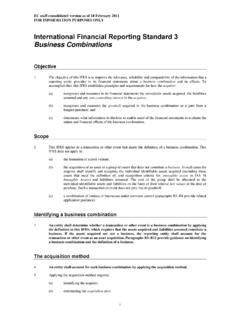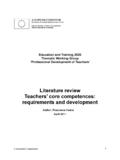Transcription of Legitimate interest opinion - European Commission
1 ARTICLE 29 data PROTECTION WORKING PARTY This Working Party was set up under Article 29 of Directive 95/46/EC. It is an independent European advisory body on data protection and privacy. Its tasks are described in Article 30 of Directive 95/46/EC and Article 15 of Directive 2002/58/EC. The secretariat is provided by Directorate C (Fundamental Rights and Union Citizenship) of the European Commission , Directorate General Justice, B-1049 Brussels, Belgium, Office No MO-59 02/013. Website: 844/14/EN WP 217 opinion 06/2014 on the notion of Legitimate interests of the data controller under Article 7 of Directive 95/46/EC Adopted on 9 April 2014 2 Table of contents Executive Summary .. 3 I. Introduction.
2 4 II. General observations and policy issues .. 6 Brief history .. 6 Role of concept .. 9 Related concepts .. 10 Context and strategic consequences .. 12 III. Analysis of provisions .. 13 Overview of Article 7 .. 13 Consent or 'necessary .. 13 Relationship with Article 8 .. 14 Article 7(a)-(e) .. 16 Consent .. 16 Contract .. 16 Legal obligation .. 19 Vital interest .. 20 Public task .. 21 Article 7(f): Legitimate interests .. 23 Legitimate interests of the controller (or third parties) .. 24 Interests or rights of the data subject .. 29 Introduction to applying the balancing test .. 30 Key factors to be considered when applying the balancing test .. 33 Accountability and transparency .. 43 The right to object and beyond.
3 44 IV. Final observations .. 48 Conclusions .. 48 IV. 2. Recommendations .. 51 Annex 1. Quick guide on how to carry out the Article 7(f) balancing test .. 55 Annex 2. Practical examples to illustrate the application of the Article 7(f) balancing test .. 57 3 Executive Summary This opinion analyses the criteria set down in Article 7 of Directive 95/46/EC for making data processing Legitimate . Focusing on the Legitimate interests of the controller, it provides guidance on how to apply Article 7(f) under the current legal framework and makes recommendations for future improvements. Article 7(f) is the last of six grounds for the lawful processing of personal data . In effect it requires a balancing of the Legitimate interests of the controller, or any third parties to whom the data are disclosed, against the interests or fundamental rights of the data subject.
4 The outcome of this balancing test will determine whether Article 7(f) may be relied upon as a legal ground for processing. The WP29 recognises the significance and usefulness of the Article 7(f) criterion, which in the right circumstances and subject to adequate safeguards may help prevent over-reliance on other legal grounds. Article 7(f) should not be treated as a last resort for rare or unexpected situations where other grounds for Legitimate processing are deemed not to apply. However, it should not be automatically chosen, or its use unduly extended on the basis of a perception that it is less constraining than the other grounds. A proper Article 7(f) assessment is not a straightforward balancing test consisting merely of weighing two easily quantifiable and comparable 'weights' against each other.
5 Rather, the test requires full consideration of a number of factors, so as to ensure that the interests and fundamental rights of data subjects are duly taken into account. At the same time it is scalable which can vary from simple to complex and need not be unduly burdensome. Factors to consider when carrying out the balancing test include: - the nature and source of the Legitimate interest and whether the data processing is necessary for the exercise of a fundamental right, is otherwise in the public interest , or benefits from recognition in the community concerned; - the impact on the data subject and their reasonable expectations about what will happen to their data , as well as the nature of the data and how they are processed; - additional safeguards which could limit undue impact on the data subject, such as data minimisation, privacy-enhancing technologies; increased transparency, general and unconditional right to opt-out, and data portability.
6 For the future, the WP29 recommends implementing a recital to the proposed Regulation on the key factors to consider when applying the balancing test. The WP29 also recommends that a recital be added requiring the controller, when appropriate, to document its assessment in the interests of greater accountability. Finally, the WP29 would also support a substantive provision for controllers to explain to data subjects why they believe their interests would not be overridden by the data subject s interests, fundamental rights and freedoms. 4 THE WORKING PARTY ON THE PROTECTION OF INDIVIDUALS WITH REGARD TO THE PROCESSING OF personal data set up by Directive 95/46/EC of the European Parliament and of the Council of 24 October 1995, having regard to Articles 29 and 30 paragraphs 1(a) and 3 of that Directive, having regard to its Rules of Procedure, HAS ADOPTED THE PRESENT opinion : I.
7 Introduction This opinion analyses the criteria set forth in Article 7 of Directive 95/46/EC1 (the 'Directive') for making data processing Legitimate . It focuses, in particular, on the Legitimate interests of the controller, under Article 7(f). The criteria listed in Article 7 are related to the broader principle of 'lawfulness' set forth in Article 6(1)(a), which requires that personal data must be processed 'fairly and lawfully'. Article 7 requires that personal data shall only be processed if at least one of six legal grounds listed in that Article apply. In particular, personal data shall only be processed (a) based on the data subject's unambiguous consent2; or if - briefly put3 - processing is necessary for: (b) performance of a contract with the data subject; (c) compliance with a legal obligation imposed on the controller; (d) protection of the vital interests of the data subject; (e) performance of a task carried out in the public interest ; or (f) Legitimate interests pursued by the controller, subject to an additional balancing test against the data subject s rights and interests.
8 This last ground allows processing 'necessary for the purposes of the Legitimate interests pursued by the controller or by the third party or parties to whom the data are disclosed, except where such interests are overridden by the interests (f)or4 fundamental rights and freedoms of the data subject which require protection under Article 1(1)'. In other words, Article 7(f) allows processing subject to a balancing test, which weighs the Legitimate interests of the controller - or the third party or parties to whom the data are disclosed against the interests or fundamental rights of the data 1 Directive 95/46/EC of the European Parliament and of the Council of on the protection of individuals with regard to the processing of personal data and on the free movement of such data (OJ L 281, , p.)
9 31). 2 See opinion 15/2011 of the Article 29 data Protection Working Party on the definition of consent, adopted on (WP187). 3 These provisions are discussed in greater detail at a later stage. 4 As explained in Section , the English version of the Directive appears to contain a typo: the text should read interests or fundamental rights rather than interests for fundamental rights . 5 The reference to Article 1(1) should not be interpreted to limit the scope of the interests and fundamental rights and freedoms of the data subject. Rather, the role of this reference is to emphasise the overall objective of data 5 Need for a more consistent and harmonized approach across Europe Studies conducted by the Commission in the framework of the review of the Directive6 as well as cooperation and exchange of views between national data protection authorities ('DPAs') have shown a lack of harmonised interpretation of Article 7(f) of the Directive, which has led to divergent applications in the Member States.
10 In particular, although a true balancing test is required to be performed in several Member States, Article 7(f) is sometimes incorrectly seen as an open door to legitimise any data processing which does not fit in one of the other legal grounds. The lack of a consistent approach may result in lack of legal certainty and predictability, may weaken the position of data subjects and may also impose unnecessary regulatory burdens on businesses and other organisations operating across borders. Such inconsistencies have already led to litigation before the Court of Justice of the European Union ('ECJ')7. It is therefore particularly timely, as work towards a new general data Protection Regulation continues, that the sixth ground for processing (referring to ' Legitimate interests') and its relationship with the other grounds for processing, be more clearly understood.

















